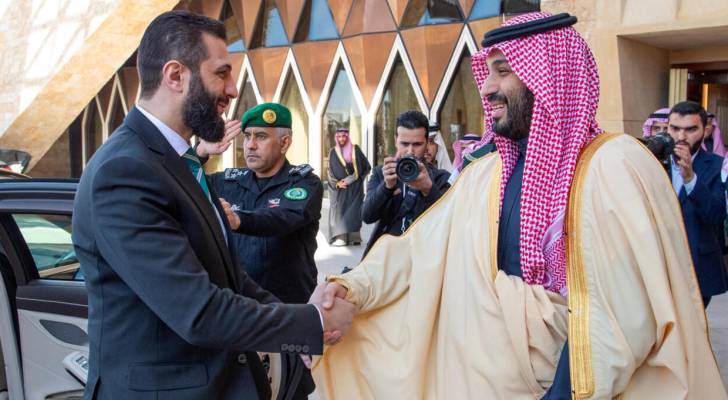Saudi Arabia’s crown prince, Mohammed bin Salman, right, welcomes Syria's interim president, Ahmed al-Sharaa, on Sunday on Feb, 2 2025. (Photo: SANA)
Saudi Arabia to pay Syria’s $15 million World Bank debt: Reports
Saudi Arabia is preparing to pay off Syria’s debts to the World Bank, a move that could unlock crucial reconstruction funds and signal a turning point in Gulf engagement with Syria following the ouster of former president Bashar al-Assad.
According to a Reuters report citing three sources familiar with the matter, Riyadh’s repayment plan would mark the first known instance of Saudi financial support for Syria since Assad was removed last year.
The plan is seen as an essential step toward enabling the World Bank to approve new grants and support for Syria’s struggling public sector.
Syria currently owes approximately USD 15 million in arrears to the World Bank. These outstanding payments have blocked access to international financial aid, particularly funding intended for rebuilding Syria’s devastated infrastructure and supporting civil servant salaries.
World Bank officials have reportedly been in talks to help rehabilitate Syria’s shattered power grid and stabilize its economy, but any such assistance is conditional on clearing Syria’s arrears.
The Saudi Ministry of Finance declined to confirm the plans, telling Reuters, “We do not comment on speculation, but make announcements, if and when they become official.”
Neither the Saudi government’s media office, the World Bank, nor Syrian officials responded to requests for comment at the time of reporting.
The move could also indicate that long-delayed Gulf Arab support is beginning to materialize. An earlier initiative by Qatar to fund public salaries was stalled due to uncertainties surrounding US sanctions. Last month, Doha announced a separate plan to supply Syria with gas via Jordan to ease its chronic electricity shortage, an effort that, according to Reuters, received quiet approval from Washington.
Despite Assad’s removal, US sanctions imposed during his rule remain in effect, limiting international engagement with Syria’s new leadership. In January, the US government granted a six-month exemption on some sanctions to support humanitarian aid, but the impact has been limited.
Reuters also reported that a high-level Syrian delegation will travel to Washington later this month for the annual spring meetings of the World Bank and IMF—the first such visit since Assad’s fall. It remains unclear whether the delegation will meet with American officials.
Inside the US, the Biden administration has been divided on how to approach Syria’s new rulers. Some officials favor deeper engagement, while others cite their past links to extremist groups like Al-Qaeda as grounds for maintaining a distance.
If Riyadh’s plan moves forward, it may mark a pivotal moment in reshaping Syria’s relationship with its Gulf neighbors—and potentially open the door to broader international rehabilitation.




